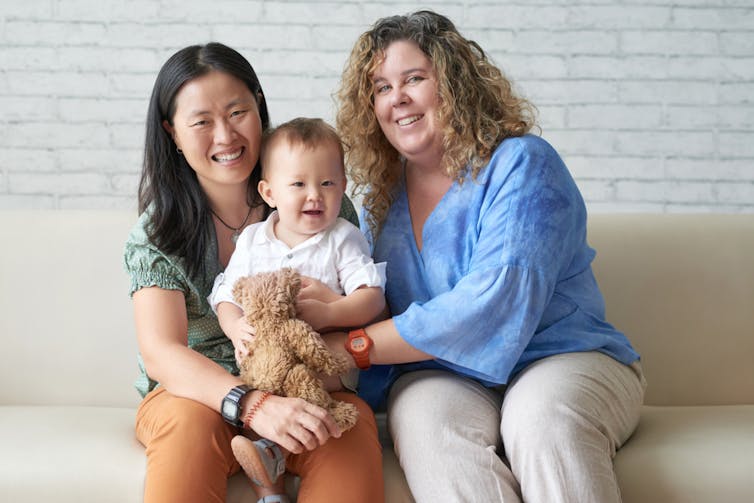
About one in three LGBTIQ+ voters are not sure who to vote for, or are considering changing who they vote for, this federal election, according to a survey by Equality Australia.
So, if you are lesbian, gay, bisexual, trans, intersex, queer or otherwise part of the rainbow community, you might be wondering what the major parties have to offer you.
Health care and LGBTIQ+ issues are among the top concerns for the roughly 850,000 LGBTIQ+ Australians eligible to vote this election. So let’s look at what each party has promised on health.
Labor
Improving health and aged care are central Labor platforms this election. Labor plans to make it easier to see a doctor, set up urgent care clinics, and cut costs of medications.
Labor has promised to consult more with LGBTIQ+ people about their health needs. It will support the national LGBTIQ+ mental health and support hotline, QLife, with a one-off grant to help the service reach more people. Labor also wants to set up a new taskforce to end Australia’s HIV epidemic.

LGBTIQ+ people would benefit from a stronger health system, but there is not much detail on how Labor’s health reforms would make health care more inclusive for LGBTIQ+ Australians.
Also missing from Labor’s health commitments is specific support for transgender people. Its 2021 national platform said it wanted to ban gay conversion practices and unnecessary medical treatment of intersex people, but these have not been election promises this year.
Read more: Yes, words can harm young trans people. Here's what we can do to help
The Greens
The Greens have also focused on affordable health care this election. They want to expand Medicare to include dental and mental health care by reinvesting private health insurance rebates into the public system.
Out of all the major parties, The Greens have made the most LGBTIQ+ specific commitments this election. They propose A$285 million “to ensure all LGBTIQ+ people have access to holistic and comprehensive health services regardless of whether they live in a capital city or a rural town”. There will be funding for LGBTIQ+ community-run organisations, health services and research.

The Greens will dedicate funding to cover out-of-pocket costs for trans people accessing gender affirming health care.
They also plan to commit $132 million to act on The Darlington Statement, which advocates for intersex people.
All these commitments might seem ambitious. But they are supported by research and recommendations from LGBTIQ+ organisations.
Read more: Surgery to make intersex children 'normal' should be banned
Coalition
The Liberal Party promises support for primary and preventative health care, expansion of telehealth services, more funding for public and private hospitals, and cost cuts for private health insurance.
Its women’s health platform is based on an almost $54 million commitment to “make it easier for more Australians to become parents”. Aged care is also a big feature of its platform, as is mental health.

The Coalition assures voters it is “committed to supporting the mental health of the LGBTIQ+ community – particularly the LGBTIQ+ youth – as demonstrated by the ongoing investment in child and youth mental health and LGBTIQ+ specific programs and services”.
The Liberal Party recently announced a $4.2 million funding boost over three years for national services to support LGBTIQ+ mental health.
However, the Coalition has a patchy history when it comes to LGBTIQ+ health. Liberal and National Party members have opposed marriage equality and LGBTIQ+ inclusive sex education.
Some Coalition members recently supported religious exemptions allowing discrimination against LGBTIQ+ staff and transgender students in faith-based schools.
Liberal Party candidate for Warringah, Katherine Deves, is vocally opposed to transgender women participating in women’s sport. Prime Minister Scott Morrison has defended Deves, wrongly saying “gender reversal surgery for young adolescents” is a “significant issue”.
Call to focus on the real issues
Research shows discrimination and lack of access to inclusive services are the main contributors to the increased risk of mental health problems and suicide LGBTIQ+ people face.
Labor and the Coalition make big promises to fund and support mental health. But these efforts are undermined by both parties’ support for religious discrimination and their lack of leadership on transgender inclusion in health care and in public life more broadly.
When it comes to LGBTIQ+ issues this election, most have played out in the mainstream media as the “transgender issue”. However, this misses some of the real issues that matter to this community – freedom from discrimination and access to quality health care.
Ruby Grant is a board member of LGBTIQ+ advocacy group, Equality Tasmania. She has previously received research funding from the Tasmanian Government.
This article was originally published on The Conversation. Read the original article.







